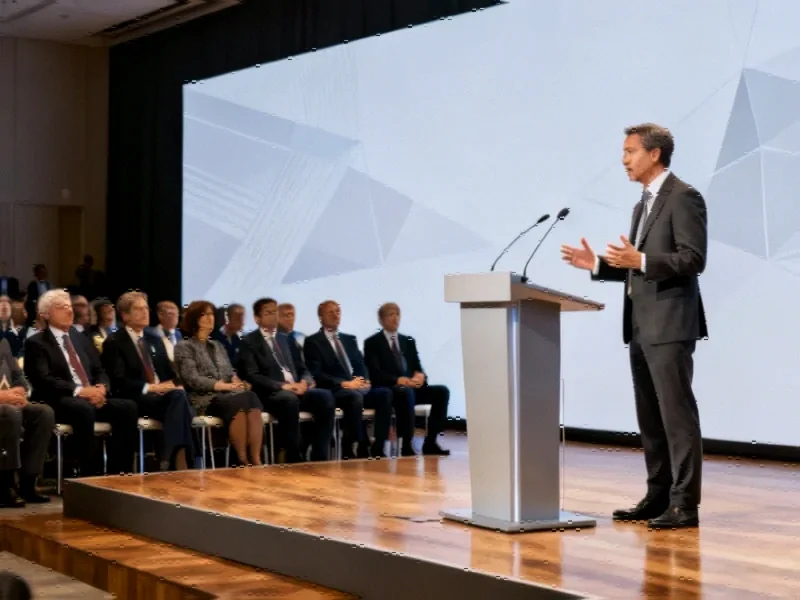Tech Titan’s Diplomatic Mission
Nvidia CEO Jensen Huang is set to make strategic appearances at the Asia-Pacific Economic Cooperation CEO Summit in South Korea from October 28-31, marking a significant moment for the AI chipmaker’s global expansion ambitions. The summit, running parallel to the APEC leaders’ meeting, provides Huang with a crucial platform to engage with political and business leaders across the 21 member economies.
Huang’s participation comes at a pivotal time for both Nvidia and the broader technology sector, as companies navigate complex international trade relationships and supply chain challenges. The CEO’s planned meetings with top Korean executives from Samsung Electronics and SK Hynix highlight the critical importance of memory chip partnerships in advancing AI infrastructure worldwide.
Deepening Korean Partnerships
Industry analysts see Huang’s focus on Korean partnerships as particularly significant given the country’s dominant position in memory chip manufacturing. Both Samsung and SK Hynix produce essential components for AI data centers that power Nvidia’s systems, making these relationships crucial for maintaining the company’s competitive edge.
“The timing of these meetings suggests Nvidia is doubling down on its Asian supply chain relationships,” noted a technology industry analyst who requested anonymity. “With ongoing trade tensions affecting global semiconductor markets, securing reliable partnerships has become more important than ever.”
This strategic engagement follows Nvidia’s broader pattern of global leadership engagement that has characterized Huang’s approach to navigating the complex geopolitics of technology.
Broader Industry Implications
Beyond the immediate Korean partnerships, Huang’s participation signals Nvidia’s commitment to several emerging technology sectors. The company specifically mentioned AI, robotics, digital twins, and autonomous vehicles as key growth areas where it aims to drive innovation and market expansion.
These technology priorities align with broader semiconductor industry developments that are pushing computational boundaries across multiple sectors. The performance gains seen in recent chip architectures demonstrate how quickly the underlying technology is evolving to meet demanding AI workloads.
Geopolitical Context and Challenges
The summit occurs against a backdrop of significant trade tensions, including recent Chinese allegations that Nvidia violated the country’s anti-monopoly laws. These developments represent the latest escalation in ongoing US-China trade disputes that have increasingly drawn technology companies into the crossfire.
Meanwhile, global workforce transformations in technology and energy sectors demonstrate how countries worldwide are adapting to new economic realities. The parallel between technological advancement and workforce development highlights the comprehensive nature of the economic shifts occurring across multiple industries.
Strategic Positioning for Future Growth
Nvidia’s focus on the APEC region reflects the growing importance of Asian markets in the global technology ecosystem. The company’s emphasis on AI infrastructure development comes as nations across the Asia-Pacific region invest heavily in digital transformation and technological modernization.
Recent energy sector innovations demonstrate how technological advancements are converging across different industries, creating new opportunities for companies that can navigate these complex interdisciplinary spaces.
The summit also provides context for understanding broader technology research initiatives happening globally, showing how different regions are contributing to the advancement of cutting-edge technologies that will shape future economic landscapes.
Looking Ahead
As Huang prepares for these high-level meetings, industry watchers will be monitoring several key outcomes, including potential partnership announcements, supply chain agreements, and any signals about how Nvidia plans to navigate the complex regulatory environments across APEC nations.
The CEO’s participation underscores how technology leaders are increasingly taking on diplomatic roles, bridging business interests with national economic priorities in an increasingly interconnected global economy. With AI positioned as a transformative technology across multiple sectors, Nvidia’s strategic engagements in Korea could have far-reaching implications for the company’s growth trajectory throughout the Asia-Pacific region and beyond.
This article aggregates information from publicly available sources. All trademarks and copyrights belong to their respective owners.
Note: Featured image is for illustrative purposes only and does not represent any specific product, service, or entity mentioned in this article.



